Photographs: Reuters M R Venkatesh
Noise pollution. That is how a friend of mine described the press conference of Telecom Minister Kapil Sibal held in New Delhi on January 7.
Being a trained lawyer, Sibal, like many others in his profession, takes recourse to cacophony as a substitute to cogent arguments, especially when their case is weak.
In a broad sweep, Sibal ridiculed the assumptions contained in the report of the Comptroller and Auditor General, defended implicitly the role of his predecessor in the 2G spectrum allocation scam, went ahead to question the need for the probe to go on any further in the matter, questioned the wisdom of the Hon'ble Supreme Court in accepting to monitor the investigation being undertaken by the CBI and that of the Opposition in demanding a Joint Parliamentary Committee to look into the entire scam.
In short, according to Sibal, everyone who has pointed an accusing finger at the government on this scam is intellectually challenged. And like several of the lawyers-turned-politicians-turned-spokespersons-turned-ministers, Sibal has several hidden agendas in just one press statement.
And there is a serious message contained within the noise pollution left over by Sibal.
Let me amplify.
. . .
Sibal's 2G scam defence: Is the PM his target?
Photographs: Reuters
According to Sibal, "The criticism of large revenue loss has received a great deal of attention in the Press because of the size of the loss stated by CAG. This estimate is based on the assumption that spectrum should have been auctioned or sold in some other manner which would have fetched the government the highest possible price. However, the logic underlying this estimate is completely flawed."
That, in effect, means that Sibal had virtually turned himself into a counsel for his predecessor A Raja while simultaneously exonerating him.
But the role of the counsel is minimal. Enter Sibal, the minister with a new telecom policy. Even that is acceptable. But the pity is that Sibal attempts to interpret the telecom policy retrospectively.
In short, he stated that the "government policy is formulated with a view to maximising public welfare, and not merely with a view to maximising government revenues. The pricing of different natural resources is often done in a manner that meets this objective."
For those who have not understood the import of the same, Sibal elaborates: "Fertilizer prices involve significant subsidy as do the prices of wheat, rice, kerosene oil, etc supplied through the Public Distribution System. In all these cases if the objective of the government were only to maximise revenues, much higher price would be charged, but there are good reasons why that is not done."
. . .
Sibal's 2G scam defence: Is the PM his target?
Image: Former telecom minister A Raja.Photographs: Reuters
One is not sure whether subsidising telecom is an avowed policy of the Government of India and if so is it constitutionally tenable, morally acceptable and financially justifiable.
His predecessor likened 2G to rice distributed through the PDS and 3G to Basmati rice, and came to a conclusion that the two are not comparable, little realising that the two are rice in the first place.
Sibal the minister goes one step further: he attempts to find the link between telecom policy and fertiliser pricing as well as food subsidy policies.
Lawyers call this 'court craft'. In simple language this is called an attempt at creating confusion by arguing in circles.
But more diffusion is to follow. According to him the new telecom policy of the then National Democratic Alliance government in 1999 "explicitly recognised the need to bring greater competition in the telecom sector in both urban and rural areas and to provide a level playing field for all players."
. . .
Sibal's 2G scam defence: Is the PM his target?
Image: The telecom scamcost the country dear.The operating word is 'competition', which was to be the driving force in ensuring increase in tele-density and also lowering of tariffs.
And that is the crux of the issue which Sibal cleverly avoids.
Interestingly, he points out that the "critics of the change in policy had argued at the time that the change in the contractual terms resulted in a loss to the exchequer of about Rs 40,000 crore (Rs 400 billion). Similarly, the reductions in licence fee in January 2001 and again in April 2004 can also be interpreted as benefiting select players at the expense of the national exchequer by the then government."
Fair enough. If that were so, why talk of a loss during the NDA government aggregating to Rs 140,000 crore (Rs 1.40 trillion) now? Yet, he claims that his predecessor only followed the policy of the previous government.
Is the government of the day not explicitly mandated to correct the wrongs of the previous regime and put in place policy alternatives to prevent further loss to revenue while booking all those who caused loss to the exchequer?
. . .
Sibal's 2G scam defence: Is the PM his target?
Image: The telecom minister rejected the CAG's calculation of the loss to the country.Photographs: Reuters
Does not all this amount to dereliction of duty? What is indeed bizarre is Sibal's conclusion -- that despite following the policy of NDA (which resulted in a loss of Rs 150,000 to the revenue in 2001), there was no loss to the revenue in 2007-08!
Adjusting the time value of money well this might be close to Rs 400,000 crore (Rs 4 trillion) now! Sibal neatly side steps this issue.
Given all these arguments Sibal concludes, "It is in this background that successive governments have chosen to allocate telecom licences and spectrum on a basis other than revenue maximisation. The Trai (Telecom Regulatory Authority of India) has consistently taken the view that revenue generation should not be a major determinant of the policy governing the telecom sector."
A casual reading of this press statement of the telecom minister may mislead the reader into believing that Sibal is defending his predecessor by tacitly assuming the role of a counsel for A Raja.
But readers must well realise that there are deep divisions within the first family of the Dravida Munnetra Kazhagam on retaining Raja within the party.
. . .
Sibal's 2G scam defence: Is the PM his target?
Image: The scam led to the disruption of Parliament during the entire Winter Session.Photographs: Reuters
DMK members in Chennai tell us that it is a matter of time before Raja is discarded by the DMK leadership.
So the presumption that Sibal would be concerned about Raja and hence defending him is farfetched. But Sibal also knows that it is matter of time that Raja would be arrested and subjected to serious interrogation by the Central Bureau of Investigation.
Naturally the fear in the Congress camp is that should Raja raise even his little finger at anyone, and that anyone could even include the prime minister, that person would have to come under the investigation radar.
If the CBI arrests Raja, he is sure to raise the issue of keeping the prime minister fully informed vide his letters dated November 2, 2007 and December 26, 2007. And if Raja is not arrested, it is unlikely that Parliament will function.
Either way, it seems to me that the days of the incumbent prime minister are numbered, and that there is every possibility of a vacancy arising for the post of the Indian prime minister.
. . .
Sibal's 2G scam defence: Is the PM his target?
Image: Prime Minister Manmohan Singh.Photographs: Reuters
What has been stated is the obvious. Lest Raja forgets it, Sibal reminds Raja through his press statement: "The prime minister wrote to the minister of telecom on November 2, 2007 forwarding a summary of the suggestions received and requested the minister to consider all these aspects carefully. This has been wrongly interpreted in the CAG report as a direction to act in a particular manner on the issue of pricing. The only direction given by the prime minister was that the ministry should act in a fair and transparent manner and keep the prime minister informed."
Further Sibal concedes: "The issues raised in the note forwarded by the prime minister were responded to by the minister of telecom who pointed out that in the interest of ensuring a level playing field between existing operators, who had obtained licences and spectrum at very reasonable rates, and the new operators, and to ensure that new entrants could provide effective competition for the healthy growth of the sector, it would be appropriate to continue with the extant policy."
Further, Sibal added that the prime minister was "also informed that the issue of pricing of spectrum was discussed extensively between the ministry of finance and the department of telecommunications (DoT) in line with the earlier decision of the Cabinet in 2003 which left the issue of spectrum pricing to be decided by the two ministers. The minister of telecom also consulted the then external affairs minister who was the chairman of the EGoM on spectrum issues."
"Based on these consultations, the prime minister was informed that the finance minister and the DoT, after considering all options, had come to an agreement that the 2G pricing should continue as before, and that 3G spectrum would be auctioned. The prime minister accepted this outcome regarding spectrum pricing," Sibal added.
In effect, according to Sibal, Raja took all the decisions after consulting both the prime minister and the then external affairs minister Pranab Mukherjee. And if the CBI push comes to a shove, that comment from Sibal effectively rules out even Pranab Mukherjee being considered as a likely replacement to the incumbent.
. . .
Sibal's 2G scam defence: Is the PM his target?
Image: Kapil SibalPhotographs: Reuters
But if you thought that I have run you through the entire scheme, kindly wait. Sibal concedes that the CAG's findings regarding procedural irregularities in the implementation of the 'first-come-first-served' policy are in a different category and must be taken very seriously and adds: "In this case, in view of the nature of the lapses, criminal investigations are also under way. The government is totally committed to taking stringent action against any person found guilty of corruption or misconduct."
In short, Sibal seeks to demonstrate that at best there are only procedural lapses in the entire issue. And even assuming that these are serious ones, there is no revenue loss to the government.
Even assuming that there is a revenue loss to the government, the prime minister (as well as Pranab Mukhejee) was well and truly informed. In short, if Raja goes, the prime minister goes.
Whether Sibal has effectively defended Raja or not as a counsel is unclear. But surely, his target seems to be the prime minister (and Pranab Mukherjee).
PS: By seeking to dismiss any charge of financial impropriety, Sibal seems to immunise the Congress leadership from any possible fallout. Is Sibal proving his loyalty to the Congress leadership in case of a leadership change? Watch this space.
The author is a Chennai-based Chartered Accountant.

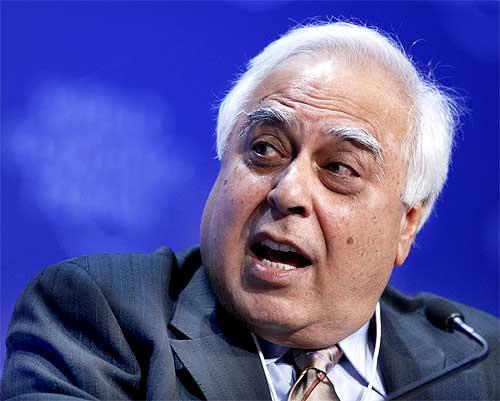
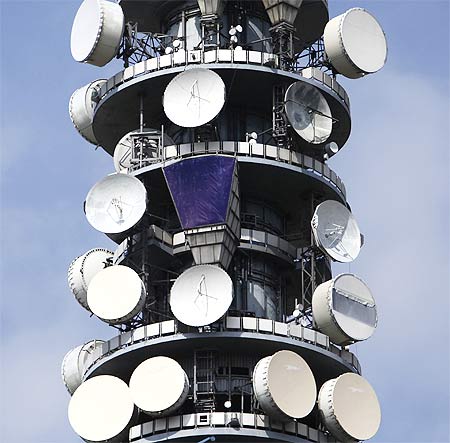
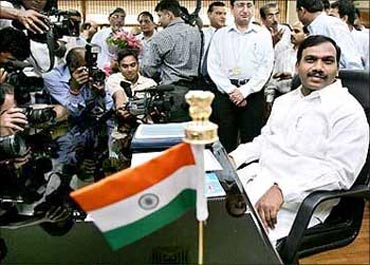
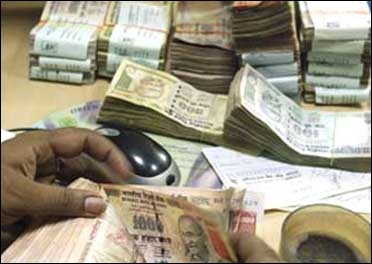
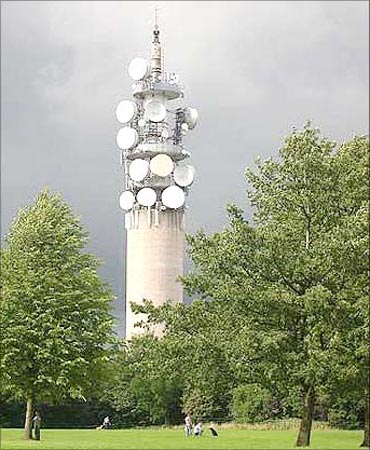
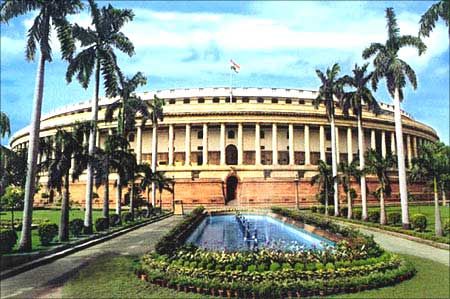
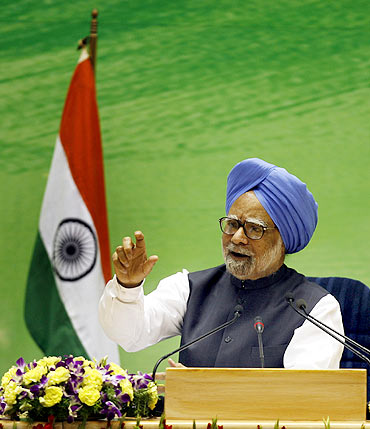
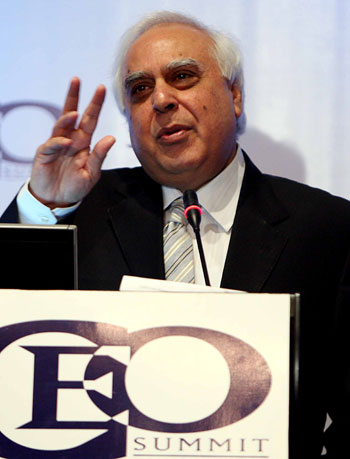
article